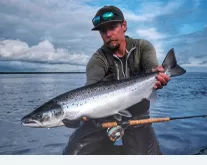Freedom or customization?
Trout ahead - ready your line
Hooked on salmon?

So are we...
Contact us and let's plan a trip to some of the magnificient salmon rivers in Iceland.
Iceland, a striking island of 103,000 square kilometers (39,756 square miles), is one of the last untouched wildernesses in Europe. In fact, towering glaciers, including Vatnajökull, Europe’s largest, cover over 11% of the country. Additionally, Hvannadalshnjúkur, its highest peak, reaches 2,119 meters. This dramatic landscape captivates travelers and adventurers alike.
Located on the Mid-Atlantic Ridge, Iceland sits on a hotbed of volcanic and geothermal activity. As a result, natural hot springs provide clean, sustainable energy for nearly all Icelandic homes. Moreover, hydropower harnesses rivers across the country. This connection to pure, untouched nature makes Iceland a premier destination for anglers looking to experience some of the cleanest waters in the world.
Iceland’s pristine rivers, lakes, and coastal waters offer unparalleled fishing opportunities. These rivers are fed by glacier meltwater and rain, creating clean, cold waters that support thriving fish populations, including Atlantic salmon, brown trout, and Arctic char. Thanks to Iceland’s strict conservation efforts, these fish stocks remain healthy. In addition, carefully regulated fishing preserves this fragile ecosystem. Ultimately, fishing here isn’t just about the catch; it’s a journey into one of nature’s most awe-inspiring backdrops.
While Iceland’s population numbers just over 300,000, nearly half live in the capital, Reykjavík, and surrounding areas in the southwest. However, the rest of the island remains sparsely populated, with an uninhabitable interior highland that stretches for miles. As a result, coastal towns are the main centers of activity. Icelanders continue to use the traditional Nordic language of their Viking ancestors, though it has evolved in pronunciation and vocabulary over the centuries. Additionally, Icelandic names still follow the Viking tradition of patronymics, which can be unique for visitors to encounter.
Iceland’s rich history dates back to its founding as one of the world’s first republics in 930, a period known as the Commonwealth Age, immortalized in the Icelandic Sagas. Icelanders regained full independence in 1944, and today the nation is governed by the Althing, one of the oldest parliaments in the world. In addition, Iceland’s cultural heritage remains strong, reflected in its commitment to preserving the environment and its deep connection to nature. This enduring relationship continues to inspire Icelandic life today.
Iceland’s residents enjoy one of the world’s highest life expectancies, thanks in part to an extensive, state-supported healthcare system and the natural benefits of a clean, unpolluted environment. Icelanders live close to nature, which contributes to a lifestyle that supports health and longevity.
Whether you’re drawn by the thrill of catching Atlantic salmon in crystal-clear rivers or simply wish to immerse yourself in the unspoiled beauty of Iceland, fishing here is an experience unlike any other. In Iceland, fishing is more than a sport; it’s a chance to connect with nature in one of the purest environments on earth. As you cast your line in these serene waters, you’re not just fishing—you’re stepping into a world where tradition and respect for the natural world are woven into the very fabric of the landscape.
Give us a shout and let us make an unforgettable fishing trip for you – use our contact form here.
Prepare for your adventure with The Fly Shack, is our trusted partner for top-quality gear and tackle, expert advice, and a passion for Icelandic fishing.
Conveniently The Fly Shack is the pick-up and drop-off point for our rental gear. Why not browse through their shop and see if you need anything to make your fishing trip more perfect?
Cast, connect, and create unforgettable memories in Iceland’s extraordinary waters!